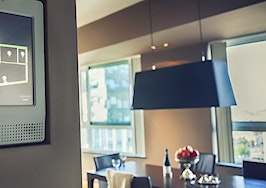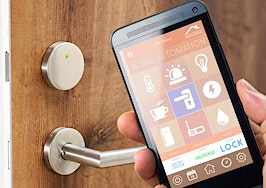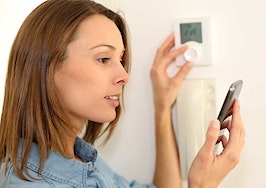- The motivating factors for adopting smart home devices are home security, energy savings, convenience and connectivity.
- Homebuyers want to be able to operate controls from a single hub -- mainly their smart phone or tablet.
- According to one survey, smart homes generally sell faster, and 60 percent of sales associates are seeing more home automation features in listings compared to just two years ago.
In the same way today’s standard smart phones use GPS navigation and take videos, so, too, will our homes be commonly outfitted with smart features that simplify and optimize our lives.
According to a survey by Coldwell Banker, 45 percent of Americans will own smart home features — or at least intend to invest in them by the end of 2016. What’s more, 54 percent of homeowners in the U.S. say they would install smart home systems if it meant they could sell their property faster.
While the idea of a smart home remains a somewhat elusive concept, homeowners are nonetheless increasingly curious and enthusiastic about it.
Smart entertainment, for instance, is all the rage, and it’ll likely be the gateway for other home features, such as smart security and temperature control, which are quickly starting to catch on.
So whether it’s the ability to lock the front door from the other side of the world or a smart bracelet that verifies your identity by your specific heartbeat to enact personalized temperature settings, these advanced home features are becoming less and less the stuff of science fiction — and more in demand by a growing number of homeowners.
In another survey conducted by Coldwell Banker and CNET, 45 percent of respondents said home automation features have already saved them an average $1,100 per year, and 87 percent said it’s made their lives easier.
That’s why it’s important to keep up with emerging smart home trends to relay knowledge to curious prospective buyers. And it’s not surprising that consumers are generally interested in devices that are user-friendly, less expensive, energy-efficient and likely to make life easier.
Here are the smart home features that families actually want for their next homes — you’ll find that they often work in conjunction with one another.
Smart refrigerators and kitchen appliances
It’s often said that the kitchen is the heart of the home — the family hub — and smart refrigerators on the market offer much in the way of keeping the family connected and alleviating daily stressors.
Nearly a quarter of homebuyers (23 percent) are interested in smart appliances, especially those pertaining to the kitchen area.
Smart refrigerators are now being outfitted with touch screens that allow you to coordinate schedules, leave notes and reminders, listen to music and post family photos.
More importantly, many are equipped with a smart cooling system to maintain optimal temperatures and regulate humidity levels, offering precision for even the most fully stocked refrigerator.
In addition, the smart fridge has interior cameras that snap a photo every time you open the door, providing a continual inventory of your perishable items. Wondering whether you need to buy more eggs or cheese when you’re at the grocery store may soon be an obsolete inconvenience.
Smart features for the kitchen also include microwave sensor cooking and ovens with self-cleaning features, precise temperature control and cooking management that can be handled remotely with your smart phone.
Icontrol Networks, a provider of connected home solutions across the world, projects smart home appliances, overall, to become a $19.6 billion global market by 2020 — an $11.9 billion increase from 2014.
Smart thermostats
Smart technology is about learning and customization, and that’s what smart thermostats are beginning to offer.
In addition to raising and lowering temperatures, smart thermostats can be managed by your phone and learn the habits of the family, like when people are usually home and the times of day temperatures are increased or lowered.
These systems can also track whether or not the home is empty to reduce energy usage, which may help lower utility bills. This is something a buyer will probably want to know about, considering 70 percent of consumers prioritize cost savings from energy efficiency.
Another issue homeowners often face is rooms in the house being cooled or warmed unevenly.
With the use of small sensors throughout the home, many smart thermostats are able to tailor warming and cooling settings to specific areas of the house to sustain uniform temperature levels in each room.
Automated lighting system
Whether it’s adjusting the dimmer setting or turning off kitchen lights when you’re not at home, the ability to control your home’s lighting system from a single device means tremendous homeowner value in more ways than one.
Smart lighting features provide homeowners with elegance, ambience and energy efficiency. With your smart phone, you can adjust the dimmers to your liking, or set up an automated schedule, eliminating the need for any touch at all.
Many smart lighting devices also allow homeowners to adjust the position of their window shades and the temperature of the home.
Moreover, a lighting system that’s controlled remotely can make it seem like someone is home and, thus, deter would-be criminals while the family is away.
And, of course, there’s that palpable sense of security upon arriving home in the dark to a lit up house.
Keyless smart lock system
It goes without saying that homebuyers are interested in security, and similar to newer vehicle models, smart locks for the home are keyless, yet many retain the use of old house keys.
Some smart locks on the market use a two-punch code and contain a built-in alarm system if anyone tries to break in.
Other smart lock products sync with your phone, which, in a sense, functions as a key fob — simply tap the lock with your phone, and access is granted.
This is especially convenient if housecleaners, friends or real estate agents need to enter your house when you’re not around. With this feature, you can set up a window of time visitors have access without having to lend them a physical key that can easily be lost or stolen.
There are also mobile apps for smart keys that enable homeowners to track and save lock activity, as well as maintain a preferred temperature in the house as they come and go. Not only is there the benefit of improved security, but apps like these may (once again) help save on energy and reduce utility bills.
Smart home safety features
Coldwell Banker reports that 48 percent of homebuyers are interested in automated safety features, and there are a bevy of smart home safety products available to connected consumers, including smart trackers for house keys, Wi-Fi carbon monoxide alarms and smoke detectors. And many of these systems can be turned on or disarmed away from the home.
Perhaps the most popular of home safety features is the security camera, and they’re becoming increasingly intelligent and available to consumers.
Some of these cutting-edge products use facial recognition technology and can distinguish a person from an animal or moving car. And with features like these, smart cameras are able to notify homeowners if they detect something abnormal.
Additionally, there are apps on the market that allow you to monitor and control your security system remotely with your phone. By utilizing infrared motion sensors and a network of cameras, you’ll know who is at home and when authorized visitors or family members come and go.
Furthermore, these apps send alerts if they detect any unauthorized activity.
Smart security systems encapsulate the need for different products to work together for the smart home to be truly realized, which is why many strategic partnerships are starting to sprout around specific products.
In the meantime, individual innovations continue to offer a clearer view of the smart home’s future landscape.
Haden Kirkpatrick is the Director of Marketing Strategy and Innovation at Esurance, where he is responsible for all initiatives related to product and service innovation. Find him on Twitter @HadenKirk.












